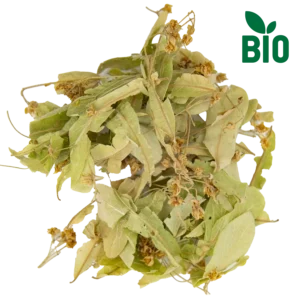Tilia or linden, with its Latin name Tilia platyphyllos, is a tree with a rich and long history in the world of herbs. This magnificent tree is known for its fragrant flowers and healing properties, making it a beloved element in many cultures and traditions. The large, green leaves and golden yellow flowers of the tilia are not only a beautiful sight in the natural landscape, but also hide a wealth of properties worth exploring.
In this article, we’ll discover the rich lore surrounding linden, its healing properties and how it has been used over the years. From its use in teas and extracts to its application in modern medicine, linden is a valuable ally in enhancing wellness and health.
Photo from jordachelr
Linden, also known as ”flamouri” in Greece, has a rich historical and cultural presence. According to one version, its name – flamuria or filyra – comes from the words ‘friend’ and ‘hyron’, meaning ‘that attracts bees’. In ancient times the leaves of the tree were used to treat food poisoning. According to Dioscorides, a poultice of melted leaves cured snake bites.

The tilia tree is a large deciduous tree with characteristic heart-shaped leaves and fragrant yellow flowers, which can reach a height of over 20 metres. It flowers in early summer, providing a wonderful sight and is often used as an ornamental. Its nectar-rich flowers make it a valuable plant for beekeepers too, producing a delicious honey.
Linden (Tilia platyphyllos) has a number of properties that make it valuable in traditional medicine. The most important of these are its anti-stress, anti-inflammatory and antioxidant actions. In particular, the flowers of the tilia are often used to prepare infusions that help combat stress and relax the nervous system.
According to scientific studies, tilia contains flavonoids and tannins, which contribute to its antioxidant action. These properties make linden useful in the prevention and treatment of colds and respiratory problems. In addition, its anti-inflammatory action makes it ideal for reducing inflammation and swelling in various parts of the body.
In addition to the properties already mentioned, there is a possibility that linden may have a positive effect on heart health. Its ability to reduce stress and relax the nervous system may benefit heart function, since high stress is often associated with an increased risk of heart disease. However, this effect needs to be further investigated and the use of tilia for heart issues should be done under the guidance of experts.
– Anti-stress properties: Helps combat stress and relax the nervous system.
– Antioxidant Action: Contains flavonoids and tannins that promote the health of the body.
– Anti-inflammatory Effect: Reduces inflammation and swelling in the body.
– Respiratory System Support: Useful in preventing and treating colds and respiratory problems.
Photo from delihayat
The use of linden in young children is a topic that should be approached with caution. In general, tilia is considered safe when used in moderate amounts and for short periods. However, in the case of children, especially the very young, its use should be under the guidance of a paediatrician.
Linden may be used in children to relieve mild symptoms, such as:
In addition, it is essential to emphasize the need to choose organic linden products, especially when these products are intended for use by children. Organic products are grown without the use of chemical pesticides and fertilizers, thus reducing the risk of introducing harmful chemicals into the body. This is particularly important for children, whose bodies are more sensitive to toxins and chemicals.
However, it is important to take into account the possibility of allergic reactions or side effects, especially in children with specific medical conditions or allergies. Before using linden in children, it is recommended to consult a specialist.

Choose the way you bring linden into your life:
Linden blossoms have a pleasant fragrant aroma. You can use them to make scented pillows that will help you relax and calm down.
Cosmetic products containing extracts of linden can be used for skin care.
Possible Side Effects and Warnings
Although tilia is generally considered safe, there are situations that require caution:
Careful use and expert advice are critical to avoid potential adverse reactions.
In this article we have examined the multidimensional uses and benefits of tilia (Tilia platyphyllos), a valuable herb with a rich history in traditional and modern medicine. The main points highlighted include:
We encourage readers to continue exploring and utilizing linden in their daily lives. This is either for therapeutic purposes or simply to enjoy a healthy and tasty tea. Herbs are nature’s medicines and with proper care, they can become our allies for a healthier life.
Subscribe to our newsletter to stay informed about herbs, recipes, exclusive offers, and receive a 15% discount on your first order!

Ευχαριστούμε πολύ τα παρακάτω websites για τη συνδρομή τους σε επιπρόσθετο, ελεύθερο φωτογραφικό υλικό (free stock) που χρησιμοποιείται στην ιστοσελίδα μας:
Pixabay.com
Pexels.com
Unsplash.com
Freepik.com
Canva.com
Adobe.com
Σταύρος Δεβεράκης (Φωτογράφος)
Many thanks to the following websites for their subscription to additional, free stock photography used on our website:
Pixabay.com
Pexels.com
Unsplash.com
Freepik.com
Canva.com
Adobe.com
Stavros Deverakis (Photographer)